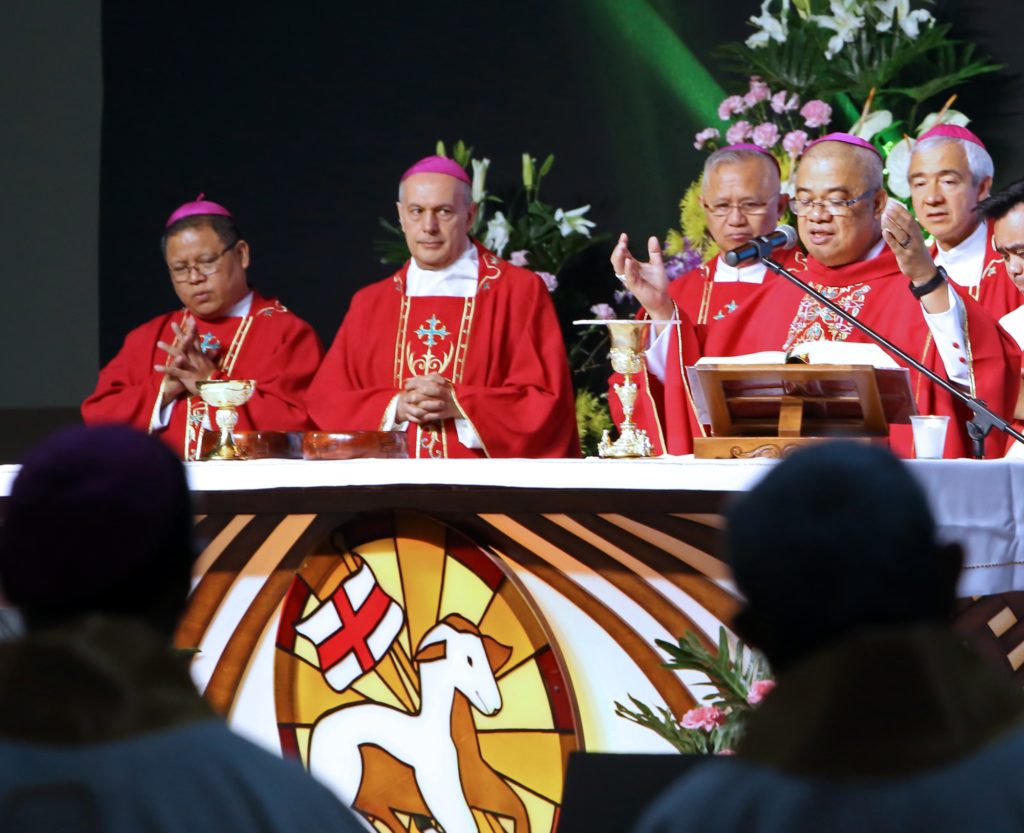
NATIONAL SEMINARY FORMATORS ASSEMBLY/JAN. 22, 2018:Bishop Gerry Alminaza (right) presides over the Mass to welcome at least 30 bishops, and 500 priests from different parts of the Philippines, Singapore, and Malaysia for the National Seminary Formators assembly at the IC3 Pavilion in Cebu City. With him is Archbishop Gabriele Giordano Caccia, the papal nuncio to the Philippines (second from left) and Cebu Archbishop Jose Palma who was supoosed to officiate the Mass but asked for a substitute after he lost his voice following the celebration of the Fiesta Señor.(CDN PHOTO/JUNJIE MENDOZA)
At least 400 seminary formators in the Philippines have gathered in Cebu City to discuss the implementation of new guidelines to improve the quality of priests in response to new and emerging challenges of modern society.
Bishop Gerardo Alminaza, chairman of the Catholic Bishops Conference of the Philippines’ (CBCP) Episcopal Commission on Seminaries, said professors of the different seminaries in the country have to sit down and come up with a draft on how to carry out the updated standards of seminary formation released by the Vatican in 2016.
“Our concern is the formation of future priests. As disciples of the Lord, we never stop learning. We should nurture and maximize the gift of priestly vocation,” he said in a press conference shortly after the Mass to welcome participants of the five-day conference that started yesterday at the IC3 Convention Center.
Among those who attended the gathering were Archbishop Gabriele Giordano Caccia, the Apostolic Nuncio to the Philippines; Archbishop Jorge Carlos Patron Wong, the secretary of the Vatican’s Congregation of the Clergy; and Cebu Archbishop Jose Palma.
Also present were about 30 bishops led by Davao Archbishop Romulo Valles, president of the CBCP, and at least 400 seminary formators.
Manila Archbishop Luis Antonio Cardinal Tagle is expected to join the conference in the coming days.
In December 8, 2016, the Vatican’s Congregation of the Clergy issued a document, entitled Ratio Fundamentalis Institutionis Sacerdotalis or ‘The Gift of Priestly Vocation,’ an updated instrument for the formation of priests.
In an interview with the Osservatore Romano, Cardinal Beniamino Stella, Prefect of the Congregation for the Clergy, says the updated guidelines drew inspiration from Pope Francis’ teachings and spirituality, especially regarding “temptations tied to money, to the authoritarian exercise of power, to rigid legalism, and to vainglory.”
One significant innovation is the introduction of a “propaedeutic period upon entrance to the Seminary” to validate the vocation of candidates.
The updated document also emphasizes the need for dioceses and religious orders to guard against admitting potential sex abusers to the priesthood by making sure would-be priests have not been involved in any way with “any crime or problematic behavior in this area.”
While they respect these persons, the same guidelines disallow “those who practice homosexuality, present deep-seated homosexual tendencies or support the so-called ‘gay culture’” from studying at the seminary since it would gravely hinder them from relating correctly to men and women.
Alminaza said the five-day convention in Cebu City is meant to come up with a policy that is more relevant and applicable in the Philippines.
“We hope to generate important materials that will become part of the inculturization of the guidelines for priestly vocation. We share our best practices and important lessons we learn. Please pray that we will be guided and that this coming together will not be in vain but will instead lead to the renewal of society,” he explained.
Archbishop Wong, on his part, said Pope Francis was informed about the gathering in Cebu.
“The Church of the Philippines and the people of this country are in the heart of the Holy Father. He hopes for the growth of priestly vocation. He wants to have priests who are pastors and shepherds who are formed in the humanity and heart of Jesus,” he said.